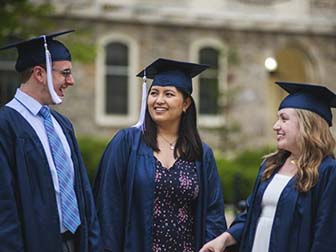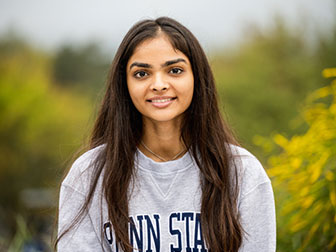UNIVERSITY PARK, Pa. — Penn State’s College of Agricultural Sciences celebrated another year of outstanding success and accomplishments in research during the 2024 Research Awards Ceremony, held Nov. 19 at the Hintz Family Alumni Center on the University Park campus.
Troy Ott, dean of the College of Agricultural Sciences, kicked off the ceremony by speaking to the college’s efforts in shortening the distance between discovery and impact.
“We work hard to discover new knowledge and translate that into solutions that will solve humanity's greatest challenges,” Ott said. “We have people actively discovering and innovating at the edge of the unknown through fundamental research and others that are translating this knowledge and those innovations to solutions that will change the world. That is the pipeline that we have to nurture — from discovery to impact.”
Blair Siegfried, associate dean for research and graduate education, spoke to the college’s accomplishments in a wide variety of sectors.
“Our success is evidenced by our increasing grant funding, commercialization of intellectual property, high impact research publications and the outstanding quality of our grad students,” Siegfried said. “And, of course, how we integrate our research with our extension programs and graduate and undergraduate education.”
Alex and Jessie C. Black Excellence in Research Award
This award honors tenure-track faculty in the college for exceptional and original agricultural research conducted at Penn State. It’s a tribute to the late Alex Black, a professor of animal nutrition and the associate director of the Agricultural Experiment Station, and his wife, the late Jessie Clements Black.
This year’s recipient is David Hughes, Dorothy Foehr Huck and J. Lloyd Huck Chair in Global Food Security, who has published more than 100 journal articles in prestigious publications such as Science, Proceedings of the National Academy of Sciences, and Current Biology. He also has brought in more than $31.2 million in funding from highly competitive grant programs at the U.S. National Science Foundation, National Institutes of Health, the Gates Foundation and other funding agencies.
Hughes has achieved research excellence in two distinct lines of work. First are his studies on how fungal infections affect ant behavior, which have provided deep insights into the effects of microbes on insect brain neurochemistry. Second is the development of PlantVillage, an initiative that empowers smallholder farmers across Africa, Asia and the Americas with affordable technologies that democratize access to knowledge.
Early Achievement in Research Award
This year’s recipient is Fang (Rose) Zhu, assistant professor of entomology, whose work focuses on the mechanisms insects use to adapt to natural and synthetic toxins.
Zhu uses molecular biology, genomics and structural biology to explore insecticide resistance, and her groundbreaking work includes studies on spider mites, potato beetles and pesticide toxicity in bees. She also has developed advanced methods for detecting pesticide residues, now used by several Penn State labs.
Zhu has given 53 invited talks around the globe and published 71 peer-reviewed articles and book chapters, with her work cited more than 4,300 times. In 2023, she was named one of the top 2% of scientists in her field globally by Stanford University and Elsevier.
Integrated Team Award
Receiving this award were Stephan Goetz, professor of agricultural and regional economics; Claudia Schmidt, assistant professor of marketing and local/regional food systems; and Sarah Cornelisse, senior extension program specialist.
This team was acknowledged for its work addressing the untapped potential of agritourism and direct-to-consumer sales, which showed that many organizations are unaware of what agritourism is and how to overcome the challenges associated with it.



